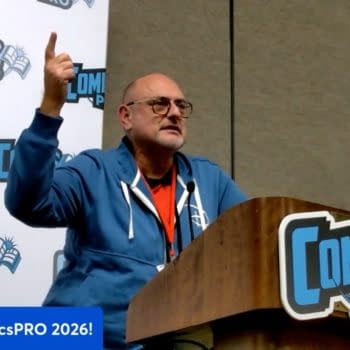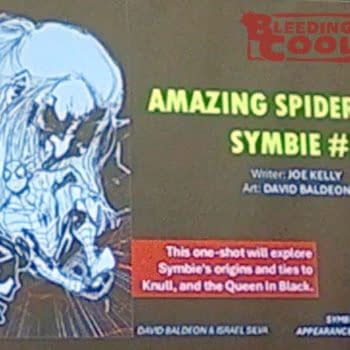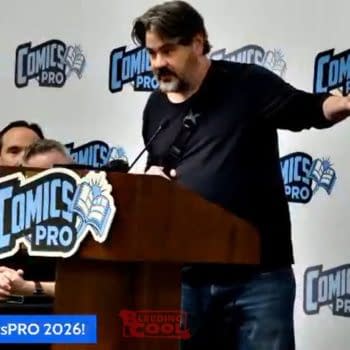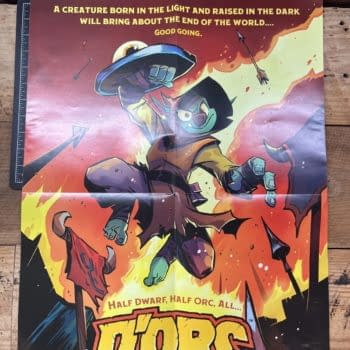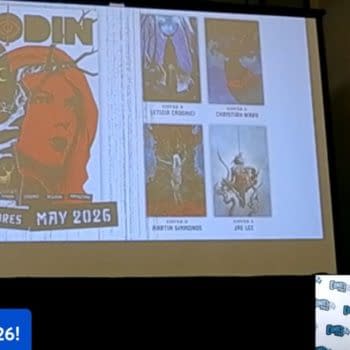Posted in: Comics, Recent Updates | Tagged: Comics, dc comics, Deconstructing Grant Morrison, entertainment, flex mentallo, frank quitely, Geoff Darrow, grant morrison, Peter Doherty, vertigo
Deconstructing Morrison Part 2: Flex Mentallo, And The Conflict Of Concept And Object
By Adam X. Smith
After Joe Colewood and I did a piece discussing the merits of Grant Morrison's Multiversity #1, it dawned on me that I was nowhere near as qualified to critique Grant Morrison's work as I had initially thought. As a result, I've decided it's high time I give some works of his that I've not yet read – and some that I have – a reappraisal. This week, I take a look at Flex Mentallo.
In the time since the previous column was posted, there's been some discussion in the comments and other posts on the site about whether or not looking for some kind of hidden message in Grant Morrison's work is doing it a service it doesn't deserve. Nothing wrong with that sentiment – certainly there is work that he and indeed a lot of other writers produce that is nowhere near as clever or interesting as they make it out to be.
Either way, however easy it might be to judge the whole stable by the muck, I'm not going to take the easy road and make broad generalisations – the reason I'm doing this is because, whether I like his work or not, I think it's better to challenge my own perceptions of his work, and get some material out of it to boot. Some will assume I'm only reading his work so I can complain about it, and that's perfectly fine too – people seem to read my stuff for that reason all the time; it doesn't stop me wanting to write what I want to write about. As a great man once said, I'm willing to place myself at great personal risk for the sake of entertainment, and I'm willing to put you at great personal risk, for the same reasons.
So anyway…
Although my work on this series began as a result of my desire to finally read Flex Mentallo: Man of Muscle Mystery after my self-imposed exile from the DC Universe roughly a year ago, and was supplemented by my subsequent reading of Animal Man, my colleagues advised me that it would be better to check out Doom Patrol first, the pages of which the Man of Muscle Mystery originally sprang from. But since doing that will result in my already far from spotless mind completely losing my first impressions of the series and since this is my stinkin' column damn it, I've tried to write whatever I can down before I completely lost my train of thought. Here goes.
Flex Mentallo began as Grant Morrison's parody of the (now largely forgotten) Charles Atlas adverts that appeared in American comics, a burly strongman in leopard print trunks and not a lot else with the power of "mind over matter"; the ability to affect reality by flexing his Herculean frame; a post-modern pastiche of the old chestnut that if you're a weedy kid with spots who gets beaten up by bullies and can't get a girl, all it takes is to send off for a mail-order chest expansion kit that'll turn you into superhuman. I know – a little on the nose, but as a retro-hipster spin on a camp stereotype it could be worse (c.f. Rocky Horror). So after a couple of appearances in Doom Patrol, Flex got his own four-part spin-off miniseries illustrated by Frank Quitely.
Okay, look – I'm not going to try to explain the major plot details of Flex Mentallo. Not because it's complicated or I don't understand it or even because I think it will spoil the surprise – but because the plot in some ways is the least important part of what you need to be able to understand about the piece. The concept, Morrison seems to be arguing, is more important than the journey, and the concept is about as much help as you really get anyway.
It's a small mercy, as it turns out, that Morrison in his eternal wisdom completely spoiled the plot of Flex in the pages of his autobiography comic book history book Supergods, because if it weren't for having read that first I'd have almost no clue as to what is going on in any of it, based on what I'm able to see on the page. Scenes chop and change in a way that seeks to be random. We're shown realities within realities, like Horton looking at a civilisation nestled on a speck of dust whilst being trapped on a dust-speck of his own one reality removed from our own, with each level of reality blurring back and forth.
There's a level of metatextuality to Flex that would have proved familiar if I'd done the sensible thing and started with Animal Man, worked my way through Doom Patrol and The Invisibles like a good little boy, and then and only then picked up Flex. But that didn't happen, so I've got to deal with the hand I've been dealt.
Even though Flex, The Invisibles and The Filth (pray that I never get started on that inexorable bilge) are part of Morrison's "hypersigil" trilogy, they are fundamentally distinct pieces that all have one thing in common: Grant Morrison's ego (in the Freudian sense, at least). While the use of animal rights activism and ethical vegetarianism in Animal Man raised a few interesting questions – even if it came off as preachy and the ideological opposites of Buddy Baker were often cartoonish straw men – and its own dabbling with the fourth wall paved the way for Flex's focus on "fractal reality", the level of author self-insertion here borders on the level of pretence rarely seen outside of a prog rock concept album, in particular Pink Floyd's The Wall – there's even a drug-addled author surrogate going through an existential crisis while talking into a portable phone shaped like a toy submarine-car-thing in the gutter whilst in the middle of either a fatal overdose or a transition into a higher being.
There seems to be a certain amount of Grant being at the height of his fame with all the excess which that entails and trying to channel that into his work, resulting in a lot of ponderous rock star whingeing about parents and growing up as a child of the hippie generation that would be a lot less annoying if it weren't the subject of his aforementioned interminably rambling memoirs. There's some additional business about the author having a traumatic experience in a shed with a bunch of street urchins and a leery uncle that seems to be either placed specifically for shock value or an attempt to turn what might or might not have been a more personal trauma into part of the narrative.
The fact that I can't tell which it's meant to be bothers me, as it seems like the kind of thing I'd remember him mentioning before. Moments like this can't help but raise the question: is this Grant's way of crying for help or Grant raising the spectre of child abuse to get attention? Is there a something deeper to this, or did he just think it was clever at the time? The fact that it's followed almost immediately by an escape into fantasy doesn't help to resolve matters, and ultimately the point, if there ever was one, is lost on me.
Thank God, then, for Quitely's artwork – in collaboration with colourist Peter Doherty, even in the moments when Flex stretched my patience as a narrative, as a piece of visual art it's consistently exquisite to behold; it is possible that the only person better at drawing in Quitely's style of comics is Geoff Darrow, but evidently Geoff was busy making Geoff Darrow comics. But that's okay, because the thing I take away from how Quitely is able to render the things Morrison imagine is that whilst certain artists complement their writer's style, it's much rarer when the creative team actively gels the way these two do. Quitely understands scale and detail as only a true draughtsman does, and his work here gives each sequence of panels a depth most pieces of art can rarely achieve.
And that I think is the handle: Flex Mentallo is, for better or worse, not a traditional comic book, it's the comic book as pop art. In its appropriation of kitsch objects and ideas, of ideas that were once mainstream but have since fallen by the wayside, it attempts to make a statement about the state of the comic industry*, and even if that statement doesn't amount to much more than "superhero comics don't have to be gritty and 'realistic' to be cool" or that "just because something is imaginary doesn't make it any less real", it does it with so much polish and finesse that it doesn't really need the tortured rock star writer schtick on top gumming up the works. Certainly, there's layers with varying degrees of subtlety: the recurring image of the half-answered crossword puzzle that could possibly read "Shazam" (but doesn't), the concept – reused later in (amongst other things) his run on Batman – that the human imagination is the fifth dimension. There's no shortage of things in there that we could try to make a grand unifying theory of Grant Morrison out of.
But at the end of the day, sometimes a cigar is just a cigar.**
*Let us not forget that this miniseries came out in 1996, at the festering heart of what was the Great Comic Book Industry Crash when this…
…Was what people in the industry thought comics should look like.
**On the other hand…
Adam X. Smith is a paranoid android from the Planet X. For the last 27 years he has been living amongst the people of Birmingham, England (and more recently the University of Lincoln) ostensibly as a student of the school of hard knocks (also BA Hons Drama), but secretly on a mission to scout out the planet for invasion by alien forces; his weekly communiques on his various blogs are actually highly coded messages to his extra-terrestrial masters. He enjoys the musical stylings of local chiptune-metal band Elmo Sexwhistle, the fiction of Kim Newman, Kurt Vonnegut and Chuck Palahniuk, and his hobbies and interests include film-making, drama, occasional Youtubing, journalism and plotting the subjugation of humanity. He can be found on Youtube, Tumblr, Twitter or by jamming an ice-pick through the optic chiasm.
















